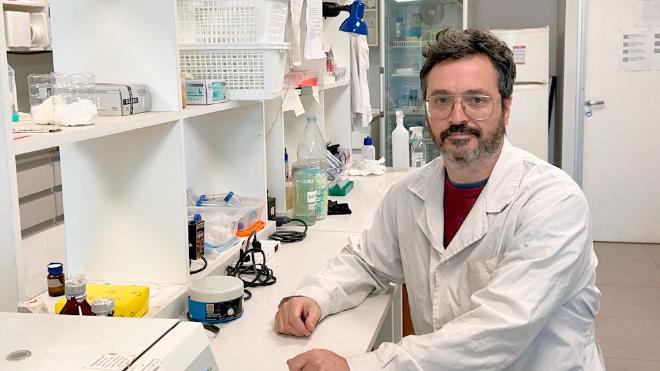

An international research team, which included specialists from CONICET, in Argentina, demonstrated that the protein GRASP55 plays a fundamental role in the antigen presentation performed by dendritic cells, which allows for the activation of the immune response against pathogens, tumor cells, and other substances that pose a threat to the organism. According to the research findings, this protein, previously known for its role in the unconventional secretion of proteins, facilitates the transport of antigens to the surface of dendritic cells, initiating the immune response by T lymphocytes. The study was published in the journal Cell Reports.
Dendritic cells #
Exogenous antigens are substances recognized by the immune system as foreign or harmful, triggering the adaptive immune response in order to eliminate them and thus protect the organism from various diseases. Some examples of antigens include pathogenic microorganisms (viruses or bacteria), toxins, and tumor cells.
In the context of the adaptive immune response, the so-called dendritic cells play a fundamental role by acting as ‘sentinels of the organism’. “These cells detect and capture antigens and isolate them in a membrane known as the phagosome. There, small antigenic fragments (antigenic peptides) are generated, which are loaded onto major histocompatibility complex molecules or MHC (MHC-I and MHC-II), to then be transported to the cell surface and activate the immune response,” explains Ignacio Cebrián, a researcher at CONICET, director of the Dendritic Cell Laboratory and Cross-Presentation of Antigens at the Institute of Histology and Embryology of Mendoza (IHEM, CONICET-UNCUYO) and first author of the study.
Protein GRASP55 #
According to the conclusions of the work, the role of GRASP55, within the phagosome, would be to allow MHC molecules loaded with antigenic peptides to be efficiently transported to the cell surface to be presented to T lymphocytes involved in the immune response.
“What we identify is that ‘GRASP55’ regulates the final transport of MHC-I and MHC-II along with antigens to the cell surface, to activate the immune system,” specifies the researcher.
New role for a well-known protein #
Cebrián explains that GRASP55 is a protein known for regulating the unconventional secretion of proteins, a fundamental biological process for transporting molecules out of the cell that do not follow the classical secretion pathway. “We started this study after noticing that the unconventional secretion pathway of proteins shares many similarities with antigen presentation. We knew that GRASP55 plays a leading role in the unconventional secretion of proteins, and the idea arose that it might also regulate antigen presentation.”
At that moment, Cebrián contacted Vivek Malhotra, a researcher working in Barcelona at the Center for Genomic Regulation (CRG), knowing that his laboratory had appropriate biological models for the study of GRASP55. The Catalan laboratory made its financial resources fully available to carry out the experiments.
“In those early encouraging experiments, we observed that, indeed, the dendritic cells that did not express GRASP55 also did not activate the immune system correctly. The central question seemed to go in that direction, and we needed to understand which specific aspect of the antigen presentation process was regulated by GRASP55,” pointed out Cebrián.
Antigens #
The researcher emphasized that, through another European Union grant, in the context of the Marie Curie Individual Fellowships call, they were able to complete the experimental phase. “In this way, we demonstrate that GRASP55 is also involved in a key step of antigen presentation, linked to the regulation of the transport of MHC-I and MHC-II and antigens to the cell surface to activate the immune system,” he indicated. “It is important to highlight the contribution of colleagues from Germany, Madrid, Barcelona, and France, as well as to emphasize the leading role played by doctoral student Sofía Dinamarca, who was key in developing this research and bringing it to publication”, he added.
According to Cebrián, the results of this research could have an application in the future: “We demonstrated that GRASP55 regulates antigen presentation, meaning that it influences the activation of specific T lymphocytes to initiate cytotoxic and helper immune responses. In this sense, to develop immunotherapies based on dendritic cells, these cells could be trained to achieve better expression of GRASP55 and thus activate the immune system more efficiently,” concluded.
Citation #
Dendritic cell phagosomes recruit GRASP55 for export of antigen-loaded MHC molecules. Authors: Ignacio Cebrian, Sofía Dinamarca, María Jesús Pena Rodríguez, Elena Priego, Nathalie Brouwers, Martina Barends, Jamina Brunnberg, Robert Tampé, Nicolas Blanchard, David Sancho & Vivek Malhotra.
Dendritic cell phagosomes recruit GRASP55 for export of antigen-loaded MHC molecules
Cebrian, Ignacio et al.
Cell Reports, Volume 44, Issue 2, 115333

